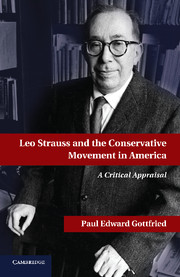5 - From Political Theory to Political Practice
Published online by Cambridge University Press: 05 January 2012
Summary
Defending Liberal Democracy
The study of political theory among Strauss and his disciples does not begin and end with reflections on dead white thinkers. Their studies have mandated political commitments, and it would be hard to ignore the transition from theory to practice already evident in the movement’s founder. In the 1960s, Strauss engaged in a prolonged, bitter battle with the American Political Science Association and his colleagues in the political science profession. He accused them of shirking their responsibility to defend the United States during the Cold War. In a controversial epilogue to Essays on the Scientific Studies of Politics (1962), edited by his student Herbert J. Storing, Strauss excoriates his profession for eschewing the struggle against Soviet totalitarianism: “The crisis of liberal democracy has become concealed by a ritual which calls itself methodology or logic. This almost willful blindness to the crisis of liberal democracy is part of that crisis. No wonder that the new political science has nothing to say against those who unhesitatingly prefer surrender, that is, the abandonment of liberal democracy, to war.”
In his epilogue, Strauss famously distinguishes the “new political science,” which refuses to take sides against Soviet tyranny, from the “old political science” that had preceded it. The old political science recognized a “common good” and “what is required for the good society,” but it was supplanted by a new one, as it succumbed to certain moral acids, particularly the fact-value distinction. “The denial of the common good presents itself today as a direct consequence of the distinction between facts and values according to which only factual judgments, not value judgments, can be true and objective.” This rapidly spreading relativism swept away even the minimal “public reason” that was present in modernists like Hobbes and which allowed them to see a common interest beyond that of the isolated individual. In the new political science, not even this limited, material standard of the good could prevail. The most political scientists could now offer an individual was to show how his or her “preferences” could be satisfied by paying attention to certain objective facts.
- Type
- Chapter
- Information
- Leo Strauss and the Conservative Movement in America , pp. 106 - 130Publisher: Cambridge University PressPrint publication year: 2011



